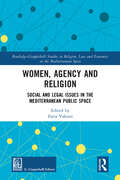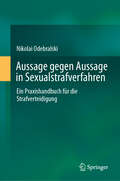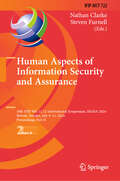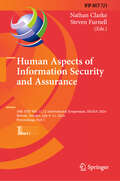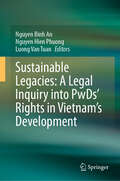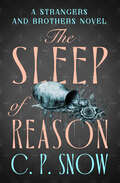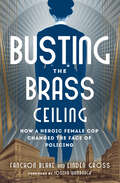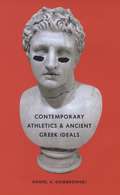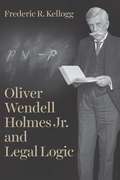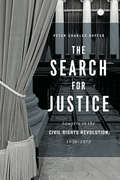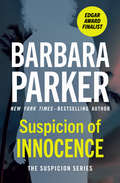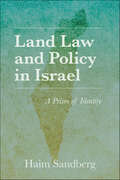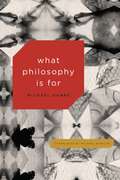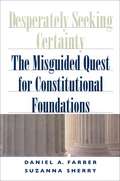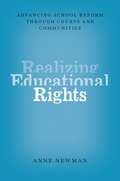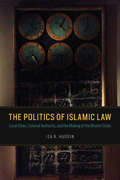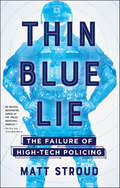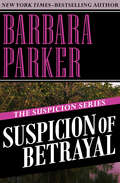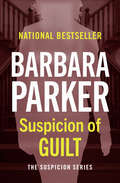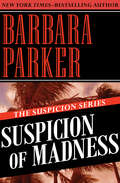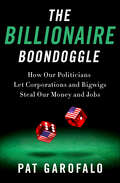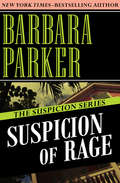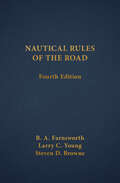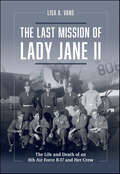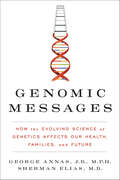- Table View
- List View
Women, Agency and Religion: Social and Legal Issues in the Mediterranean Public Space (Routledge-Giappichelli Studies in Religion, Law and Economics in the Mediterranean Space)
by Ilaria ValenziOn both Mediterranean shores, women’s agency is articulated by new social and legal actors that face the religious factor both as an asset and as a brake. This book explores how female agency is defined and takes place in the region. The collection brings together contributions of both theoretical and thematic nature mapping various experiences on the public role of women in the Mediterranean context. In particular, the book relates the two sides, observing affinities and differences in the affirmation of women’s agency. This synoptic approach avoids essentialist contraposition and dialectic between different cultural, religious and political universes and emphasizes the role of a common geopolitical space where women's agency is playing an increasingly decisive role in the building and defense of constitutional democratic political systems. The reflection is enriched by the specific analysis of the role of a “religious factor” in the process of affirmation or, in contrast, as a restraint on women’s agency. The book focuses both on the role of women believers in the processes of transformation of the political contexts of the North African and Euro-Mediterranean area, and on the role of women within religions, questioning from inside the patriarchal traditions of the latter. The book applies a multidisciplinary approach to the theme of women’s agency, in which law, sociology, theology and philosophy interact with each other. As such, it will be a valuable resource for those working in the areas of Human Rights Law, Law and Religion, Socio-legal Studies and Gender Studies.
Aussage gegen Aussage in Sexualstrafverfahren: Ein Praxishandbuch für die Strafverteidigung
by Nikolai OdebralskiDie Konstellation von Aussage gegen Aussage in Strafverfahren ist die schwierigste Beweiskonstellation für alle Verfahrensbeteiligten. Eine Aussage-gegen-Aussage-Konstellation liegt vor, wenn außer der belastenden Aussage des „Opferzeugen“ keine sonstigen, unmittelbar tatbezogenen Beweismittel zur Überführung des (den Tatvorwurf bestreitenden oder schweigenden) Angeklagten vorhanden sind, sodass Grundlage für eine Einstellung oder Anklage, eine Verurteilung oder einen Freispruch allein eine Aussage ist. Diese Situation bedeutet einerseits unwägbare Risiken, ermöglicht aber zugleich auch Chancen und Spielraum für die Verteidigung des Beschuldigten. Das vorliegende Fachbuch nimmt die besonderen Herausforderungen dieser Beweiskonstellation in den Blick und zeigt Möglichkeiten für die Verteidigung auf. Neben einer umfassenden Übersicht zu einzelnen Elementen der Aussagen sowie den juristischen Anforderungen an die Beweiswürdigung wird das Werk abgerundet durch eine umfassende aktuelle Rechtsprechungsübersicht zum Thema Aussage gegen Aussage aus dem besonderen Blickwinkel des Sexualstrafrechts.
Human Aspects of Information Security and Assurance: 18th IFIP WG 11.12 International Symposium, HAISA 2024, Skövde, Sweden, July 9–11, 2024, Proceedings, Part II (IFIP Advances in Information and Communication Technology #722)
by Nathan Clarke Steven FurnellThe two-volume set IFIP AICT 721 +722 constitutes the proceedings of the 18th IFIP WG 11.12 International Symposium on Human Aspects of Information Security and Assurance, HAISA 2024, held in Skövde, Sweden, in July 9–11, 2024. The 39 full papers presented were carefully reviewed and selected from 55 submissions. The papers are organized in the following topical sections: Part I - Management and Risk; Social Engineering; Technical Attacks and Defenses; Usable Security. Part II - Awareness and Education; Privacy.
Human Aspects of Information Security and Assurance: 18th IFIP WG 11.12 International Symposium, HAISA 2024, Skövde, Sweden, July 9–11, 2024, Proceedings, Part I (IFIP Advances in Information and Communication Technology #721)
by Nathan Clarke Steven FurnellThe two-volume set IFIP AICT 721 + 722 constitutes the proceedings of the 18th IFIP WG 11.12 International Symposium on Human Aspects of Information Security and Assurance, HAISA 2024, held in Skövde, Sweden, in July 9–11, 2024. The 39 full papers presented were carefully reviewed and selected from 55 submissions. The papers are organized in the following topical sections: Part I - Management and Risk; Social Engineering; Technical Attacks and Defenses; Usable Security. Part II - Awareness and Education; Privacy.
Sustainable Legacies: A Legal Inquiry into PwDs’ Rights in Vietnam’s Development
by Nguyen Binh An Nguyen Hien Phuong Luong Van TuanThis book offers a comprehensive exploration of Vietnam's legal landscape through the lens of inclusivity. Covering topics ranging from educational rights and workplace inclusivity to corporate social responsibility and transport accessibility, this book provides a nuanced understanding of the challenges and opportunities facing PwDs in Vietnam. What sets this book apart is its interdisciplinary approach, weaving together legal analysis, policy evaluation and real-world case studies to provide practical insights for policymakers, legal practitioners, academics, and advocates. With a focus on actionable recommendations, it is a valuable resource for anyone interested in promoting sustainable development and social justice for persons with disabilities. Accessible yet rigorous, the book is aimed at a wide audience, from legal practitioners and policymakers to disability rights activists and academics. It serves as both a roadmap for legal reform and a catalyst for promoting a more inclusive and just society
The Sleep of Reason (The Strangers and Brothers Novels)
by C.P. SnowWith England on the brink of disruptive social change, a man revisits his past—and confronts a monstrous crime—in this novel of &“clarity and perceptiveness&” (The Atlantic). In his late middle age, semi-retired Lewis Eliot, accompanied by his teenage son, journeys to the provincial town where he spent his poverty-stricken boyhood—and where his father is now dying. The London of the 1960s is changing, and this visit is a reminder of the passage of time and the world left behind. But Eliot&’s reflections are disrupted when he reunites with his now-elderly mentor, George Passant, and becomes involved in a horrifying child-murder case in which Passant&’s niece stands accused. And as Eliot sees his old friend through the trial, troubling questions arise about responsibility, the root causes of evil, and how, as the painter Goya once observed, the sleep of reason produces monsters. &“[The Strangers and Brothers series] invites comparison not only with Proust but with the other notable multi‐volume novel about modern Britain, Anthony Powell&’s The Music of Time.&” —The New York Times &“Lewis Eliot throughout the series has been a most engaging person. . . . Snow is at his best when writing about people under pressure: he makes the struggle for power of engrossing interest.&” —The Atlantic &“[Snow] looks at the social condition so that he can see better the human condition.&” —Queen&’s Quarterly
Busting the Brass Ceiling: How a Heroic Female Cop Changed the Face of Policing
by Linden Gross Fanchon BlakeA policewoman chronicles her historic legal battle against sexism within the LAPD in this &“valuable . . . and at times, frightening&” memoir (Kirkus Reviews). Former Army major Fanchon Blake dreamed of becoming a top cop. She joined the LAPD in 1948, confident that her efforts and talent would be rewarded. Instead, despite long hours and high achievement ratings, Blake—like all other women on the force—was denied promotion time and again. Over the years, the tenacious officer challenged the LAPD&’s discriminatory agenda from within. Eventually, she broke the &“blue wall of silence&” by going to the press. And when all else failed, Blake saw one last chance to effect change: she filed a complaint against the LAPD with the federal Equal Employment Opportunity Commission in 1973. What followed was a harrowing struggle against discrimination that would make history for women and other minority groups. Despite the ensuing verbal abuse, silent treatment, and intimidation, Blake pushed on. Seven years later, her heroic efforts would finally make it possible for women to bust through the brass ceiling.
Contemporary Athletics & Ancient Greek Ideals
by Daniel A. DombrowskiDespite their influence in our culture, sports inspire dramatically less philosophical consideration than such ostensibly weightier topics as religion, politics, or science. Arguing that athletic playfulness coexists with serious underpinnings, and that both demand more substantive attention, Daniel Dombrowski harnesses the insights of ancient Greek thinkers to illuminate contemporary athletics. Dombrowski contends that the ideas of Plato, Aristotle, and Plotinus shed important light on issues—such as the pursuit of excellence, the concept of play, and the power of accepting physical limitations while also improving one’s body—that remain just as relevant in our sports-obsessed age as they were in ancient Greece. Bringing these concepts to bear on contemporary concerns, Dombrowski considers such questions as whether athletic competition can be a moral substitute for war, whether it necessarily constitutes war by other means, and whether it encourages fascist tendencies or ethical virtue. The first volume to philosophically explore twenty-first-century sport in the context of its ancient predecessor, Contemporary Athletics and Ancient Greek Ideals reveals that their relationship has great and previously untapped potential to inform our understanding of human nature.
Oliver Wendell Holmes Jr. and Legal Logic
by Frederic R. KelloggWith Oliver Wendell Holmes, Jr. and Legal Logic, Frederic R. Kellogg examines the early diaries, reading, and writings of Justice Oliver Wendell Holmes, Jr. (1841–1935) to assess his contribution to both legal logic and general logical theory. Through discussions with his mentor Chauncey Wright and others, Holmes derived his theory from Francis Bacon’s empiricism, influenced by recent English debates over logic and scientific method, and Holmes’s critical response to John Stuart Mill’s 1843 A System of Logic. Conventional legal logic tends to focus on the role of judges in deciding cases. Holmes recognized input from outside the law—the importance of the social dimension of legal and logical induction: how opposing views of “many minds” may converge. Drawing on analogies from the natural sciences, Holmes came to understand law as an extended process of inquiry into recurring problems. Rather than vagueness or contradiction in the meaning or application of rules, Holmes focused on the relation of novel or unanticipated facts to an underlying and emergent social problem. Where the meaning and extension of legal terms are disputed by opposing views and practices, it is not strictly a legal uncertainty, and it is a mistake to expect that judges alone can immediately resolve the larger issue.
The Search for Justice: Lawyers in the Civil Rights Revolution, 1950–1975
by Peter CharlesThe civil rights era was a time of pervasive change in American political and social life. Among the decisive forces driving change were lawyers, who wielded the power of law to resolve competing concepts of order and equality and, in the end, to hold out the promise of a new and better nation. The Search for Justice is a look the role of the lawyers throughout the period, focusing on one of the central issues of the time: school segregation. The most notable participants to address this issue were the public interest lawyers of the NAACP’s Legal Defense Fund, whose counselors brought lawsuits and carried out appeals in state and federal courts over the course of twenty years. But also playing a part in the story were members of the bar who defended Jim Crow laws explicitly or implicitly and, in some cases, also served in state or federal government; lawyers who sat on state and federal benches and heard civil rights cases; and, finally, law professors who analyzed the reasoning of the courts in classrooms and public forums removed from the fray. With rich, copiously researched detail, Hoffer takes readers through the interactions of these groups, setting their activities not only in the context of the civil rights movement but also of their full political and legal legacies, including the growth of corporate private legal practice after World War II and the expansion of the role of law professors in public discourse, particularly with the New Deal. Seeing the civil rights era through the lens of law enables us to understand for the first time the many ways in which lawyers affected the course and outcome of the movement.
Suspicion of Innocence: Suspicion Of Innocence, Suspicion Of Guilt, And Suspicion Of Deceit (The Suspicion Series #1)
by Barbara ParkerEdgar Award Finalist: This Miami crime thriller by a New York Times–bestselling author is &“an exhilarating debut [and] a sizzling page-turner&” (Publishers Weekly). Gail Connor is a fast-rising attorney in a major South Florida law firm, about to make partner—until her life is derailed by the discovery of her sister&’s body in the Everglades. What at first appears to be a suicide soon becomes a homicide investigation with Gail as the prime suspect. To defend herself, Gail must unravel the tangled web of her wild younger sister&’s life, which includes connections to drug traffickers, a Native American artifact, Gail&’s own estranged husband, and a handsome Cuban-American attorney, Anthony Quintana, to whom Gail is strongly attracted. But who can she trust as she fights for justice for her sister and herself? Written by a former prosecutor, the first book in the New York Times–bestselling Suspicion series delivers &“a sun-drenched variation on the work of Scott Turow and Patricia Cornwell&” (Library Journal).
Land Law and Policy in Israel: A Prism of Identity (Perspectives on Israel Studies)
by Haim SandbergAs one of the smallest and most densely populated countries in the world, the State of Israel faces serious land policy challenges and has a national identity laced with enormous internal contradictions. In Land Law and Policy in Israel,Haim Sandberg contends that if you really want to know the identity of a state, learn its land law and land policies.Sandberg argues that Israel's identity can best be understood by deciphering the code that lies in the Hebrew secret of Israeli dry land law. According to Sandberg, by examining the complex facets of property law and land policy, one finds a unique prism for comprehending Israel's most pronounced identity problems.Land Law and Policy in Israel explores how Israel's modern land system tries to bridge the gaps between past heritage and present needs, nationalization and privatization, bureaucracy and innovation, Jewish majority and non-Jewish minority, legislative creativity and judicial activism. The regulation of property and the determination of land usage have been the consequences of explicit choices made in the context of competing and evolving concepts of national identity. Land Law and Policy in Israel will prove to be a must-read not only for anyone interested in Israel but also for anyone who wants to understand the importance of land law in a nation's life.
What Philosophy Is For
by Michael HampeWhat is the state of philosophy today, and what might it be tomorrow? With What Philosophy Is For, Michael Hampe answers these questions by exploring the relationships among philosophy, education, science, and narrative, developing a Socratic critique of philosophical doctrines. Philosophers generally develop systematic theories that lay out the basic structures of human experience, in order to teach the rest of humanity how to rightly understand our place in the world. This “scientific” approach to philosophy, Hampe argues, is too one-sided. In this magnum opus of an essay, Hampe aims to rescue philosophy from its current narrow claims of doctrine and to remind us what it is really for—to productively disillusion us into clearer thinking. Hampe takes us through twenty-five hundred years of intellectual history, starting with Socrates. That archetype of the philosophical teacher did not develop strict doctrines and rules, but rather criticized and refuted doctrines. With the Socratic method, we see the power of narration at work. Narrative and analytical disillusionment, Hampe argues, are the most helpful long-term enterprises of thought, the ones most worth preserving and developing again.What Philosophy Is For is simultaneously an introduction, a critique, and a call to action. Hampe shows how and why philosophy became what it is today, and, crucially, shows what it could be once more, if it would only turn its back on its pretensions to dogma: a privileged space for reflecting on the human condition.
Desperately Seeking Certainty: The Misguided Quest for Constitutional Foundations
by Daniel A. Farber Suzanna SherryIrreverent, provocative, and engaging, Desperately Seeking Certainty attacks the current legal vogue for grand unified theories of constitutional interpretation. On both the Right and the Left, prominent legal scholars are attempting to build all of constitutional law from a single foundational idea. Dan Farber and Suzanna Sherry find that in the end no single, all-encompassing theory can successfully guide judges or provide definitive or even sensible answers to every constitutional question. Their book brilliantly reveals how problematic foundationalism is and shows how the pragmatic, multifaceted common law methods already used by the Court provide a far better means of reaching sound decisions and controlling judicial discretion than do any of the grand theories.
Realizing Educational Rights: Advancing School Reform through Courts and Communities
by Anne NewmanIn Realizing Educational Rights, Anne Newman examines two educational rights questions that arise at the intersection of political theory, educational policy, and law: What is the place of a right to education in a participatory democracy, and how can we realize this right in the United States? Tracking these questions across both philosophical and pragmatic terrain, she addresses urgent moral and political questions, offering a rare, double-pronged look at educational justice in a democratic society. Newman argues that an adequate K–12 education is the right of all citizens, as a matter of equality, and emphasizes that this right must be shielded from the sway of partisan and majoritarian policy making far more than it currently is. She then examines how educational rights are realized in our current democratic structure, offering two case studies of leading types of rights-based activism: school finance litigation on the state level and the mobilization of citizens through community-based organizations. Bringing these case studies together with rich philosophical analysis, Realizing Educational Rights advances understanding of the relationships among moral and legal rights, education reform, and democratic politics.
The Politics of Islamic Law: Local Elites, Colonial Authority, and the Making of the Muslim State
by Iza R. HussinIn The Politics of Islamic Law, Iza Hussin compares India, Malaya, and Egypt during the British colonial period in order to trace the making and transformation of the contemporary category of ‘Islamic law.’ She demonstrates that not only is Islamic law not the shari’ah, its present institutional forms, substantive content, symbolic vocabulary, and relationship to state and society—in short, its politics—are built upon foundations laid during the colonial encounter. Drawing on extensive archival work in English, Arabic, and Malay—from court records to colonial and local papers to private letters and visual material—Hussin offers a view of politics in the colonial period as an iterative series of negotiations between local and colonial powers in multiple locations. She shows how this resulted in a paradox, centralizing Islamic law at the same time that it limited its reach to family and ritual matters, and produced a transformation in the Muslim state, providing the frame within which Islam is articulated today, setting the agenda for ongoing legislation and policy, and defining the limits of change. Combining a genealogy of law with a political analysis of its institutional dynamics, this book offers an up-close look at the ways in which global transformations are realized at the local level.
Thin Blue Lie: The Failure of High-Tech Policing
by Matt StroudA wide-ranging investigation of how supposedly transformative technologies adopted by law enforcement have actually made policing worse—lazier, more reckless, and more discriminatoryAmerican law enforcement is a system in crisis. After explosive protests responding to police brutality and discrimination in Baltimore, Ferguson, and a long list of other cities, the vexing question of how to reform the police and curb misconduct stokes tempers and fears on both the right and left. In the midst of this fierce debate, however, most of us have taken for granted that innovative new technologies can only help. During the early 90s, in the wake of the infamous Rodney King beating, police leaders began looking to corporations and new technologies for help. In the decades since, these technologies have—in theory—given police powerful, previously unthinkable faculties: the ability to incapacitate a suspect without firing a bullet (Tasers); the capacity to more efficiently assign officers to high-crime areas using computers (Compstat); and, with body cameras, a means of defending against accusations of misconduct.But in this vivid, deeply-reported book, Matt Stroud shows that these tools are overhyped and, in many cases, ineffective. Instead of wrestling with tough fundamental questions about their work, police leaders have looked to technology as a silver bullet and stood by as corporate interests have insinuated themselves ever deeper into the public institution of law enforcement. With a sweeping history of these changes, Thin Blue Lie is a must-read for anyone seeking to understand how policing became what it is today.
Suspicion of Betrayal (The Suspicion Series #4)
by Barbara ParkerAttorney Gail Connors must look to her past to discover who is threatening her family this &“gripping . . . riveting thriller&” (Publishers Weekly). Gail finally has everything she wants—a home to call her own, a growing private law practice, and a loving man in lawyer Anthony Quintana. But life is never perfect: the house needs massive renovations, her professional life is getting out of control, she&’s in the middle of a custody case with her ex, and Quintana&’s murky past continues to disturb her. Then Gail receives a series of mysterious phone calls and obscene letters threatening violence, torture, and death. The target: not Gail herself, but her ten-year-old daughter, Karen. Gail knows she&’s made enemies in her line of work. But now someone is threatening her little girl. And her tormentors are about to learn that there is no limit to how far Gail is willing to go to keep her family safe. Written by an Edgar Award finalist and former prosecutor, &“Suspicion of Betrayal works as a thriller, a psychological suspense novel, a mystery and a romance as well as an examination of cultural clashes [with] believable, realistic characters stylishly shaped&” (South FloridaSun-Sentinel). Suspicion of Betrayal is the 4th book in the Suspicion series, but you may enjoy reading the series in any order.
Suspicion of Guilt: Suspicion Of Innocence, Suspicion Of Guilt, And Suspicion Of Deceit (The Suspicion Series #2)
by Barbara ParkerWhen a Palm Beach widow dies, the dispute over her will turns deadly in this &“breathlessly paced legal thriller&” from a New York Times–bestselling author (Publishers Weekly). When wealthy Palm Beach dowager Althea Tillett dies under suspicious circumstances, it sparks a battle between those in line for an inheritance—including Gail Connor&’s old law school classmate and former lover Patrick Norris. He thinks someone has tampered with his aunt&’s will—preventing him from receiving millions he hoped to use for an urban renewal project. Although discouraged from getting involved by her own law firm and her lover, Cuban-American attorney Anthony Quintana, Gail agrees to look into Althea&’s rapacious relatives. But she soon finds herself in the middle of a family feud that&’s about much more than money. It&’s about secrets, lies, forgery . . . and murder. Written by a former prosecutor, this &“provocative, breathless&” national bestseller &“will surprise you&” (The Plain Dealer).
Suspicion of Madness: Suspicion Of Madness And Suspicion Of Rage (The Suspicion Series #7)
by Barbara Parker&“Suspense builds&” as a tropical storm and a crazed killer bear down on Connor and Quintana in the Florida Keys, in the New York Times–bestselling series (Library Journal). Despite storm warnings, lawyers and lovers Gail Connor and Anthony Quintana travel to a resort on a secluded island in the Florida Keys when a wealthy former client asks for their help with his troubled stepson, Billy, who has confessed to murder. Billy had a history with the victim—a resort employee with a promiscuous reputation and a penchant for causing trouble. But it soon becomes apparent that plenty of people may have wanted Sandra McCoy silenced for good . . . along with anyone who gets in the way. An Edgar Award finalist for the first book in the bestselling series, Suspicion of Innocence, as well as a former prosecutor herself, Barbara Parker once again gives readers a &“lively legal romp&” (Booklist). Suspicion of Madness is the 7th book in the Suspicion series, but you may enjoy reading the series in any order.
The Billionaire Boondoggle: How Our Politicians Let Corporations and Bigwigs Steal Our Money and Jobs
by Pat Garofalo"An alarming, fact-driven jeremiad urging change and action." –KirkusThe first comprehensive look at how politicians let the entertainment industry bilk taxpayers, hijack public policy and hurt economic investment, starting and ending with Trump. From stadiums and movie productions to casinos and mega-malls to convention centers and hotels, cities and states have paid out billions of dollars in tax breaks, subsidies, and grants to the world's corporate titans. They hope to boost their economies, create new and better jobs, and lure well-known events such as the Super Bowl--not to mention give their officials the chance to meet celebrities. That Big Entertainment drives bigger economies is a myth, however. Overwhelming evidence shows catering public policy to its promises results in a raw deal for the taxpaying public.In The Billionaire Boondoggle, Garofalo takes readers on a tour of publicly-subsidized corporate America to explain how that myth came to be, how much money America's elected officials throw away, and why courting Big Entertainment just courts disaster. You’ll learn how Maryland gave millions of dollars to Netflix to make House of Cards, and Nevada spent hundreds of millions on a new home for the NFL’s Raiders. New Mexico paid big money to host The Avengers, while city after city fell prey to the debt trap that is the Olympics. You’ll see how big sporting goods stores like Bass Pro Shops and big casinos across the country all get in on the subsidy scam. And you’ll see how many cities got in bed with hotel titans, including Donald J. Trump himself.This book is the go-to guide for the many ways in which American taxpayers unknowingly subsidize the TV shows they watch, the sports teams they root for and the hotels they sleep in, all based on an economic theory that only adds up for CEOs and bigwigs.
Suspicion of Rage: Suspicion Of Madness And Suspicion Of Rage (The Suspicion Series #8)
by Barbara ParkerIn the &“riveting&” finale to the New York Times–bestselling series, Miami lawyer Gail Connor is caught between the CIA, the Cuban government, and her husband (Publishers Weekly). Now married to fellow attorney Anthony Quintana, Gail agrees to accompany him to his native Cuba along with their children on a family vacation. But their plans for a holiday in Havana are scuttled when the CIA contacts Anthony with a request: make contact with his brother-in-law—a Cuban general in Castro&’s military—with an offer to help him defect. In doing so, both Gail and Anthony are plunged into a deadly power play within the Cuban government that will threaten everything they&’ve built together—and reveal a secret that could destroy Gail&’s trust in the man she loves. The explosive final novel of her electrifying Suspicion series &“takes Parker to a new level&” (Miami Herald). Suspicion of Rage is the 8th book in the Suspicion series, but you may enjoy reading the series in any order.
Nautical Rules of the Road
by Larry C. Young B. A. Farnsworth Steven D. BrowneTo celebrate the 25th anniversary of the first edition of Nautical Rules of the Road, Cornell Maritime Press has released a 4th Edition. This updated book has an easy-to-follow layout that aligns the International Rules with the corresponding Inland Rules. In addition to being highly descriptive, Nautical Rules of the Road, 4th Edition by Steven D. Browne, with early authors Larry C. Young and B. A. Farnsworth, gives the current rules as of publication and explicit comments to help readers thoroughly understand each rule. Some of the items detailed are proper lookout information to prevent collisions, positioning of light shapes, signals for fishing vessels fishing in close proximity, technical details of sound signal appliances, and violations of Inland Navigation Rules and Regulations, including penalties for negligent operations. To aid in Coast Guard examinations, the final chapter gives multiple choice, practice questions to test the reader&’s knowledge on the information found within the entire book. In addition, there is a descriptive study outline. Professional and recreational boaters alike need the new Nautical Rules on their vessels before leaving port. Don&’t toss your lines without it.
The Last Mission of Lady Jane II: The Life and Death of an 8th Air Force B-17 and Her Crew
by Lisa A. VansFurther insight into the experience for 8th Air Force bomber crews over Germany, and in German captivity. New revelations about the investigation of the murder of several American bomber crewmen by German civilians. Learn personal stories about the crewmen of Lady Jane II, including the postwar struggles of the survivors.
Genomic Messages: How the Evolving Science of Genetics Affects Our Health, Families, and Future
by Sherman Elias George AnnasTwo leaders in the field of genetics—a bioethicist-health lawyer and an obstetrician-gynecologist geneticist—answer the most pressing questions about the application of new genetics to our universal medicine and what personalized medicine means for individual healthcare.Breakthroughs in genetic research are changing modern medicine and pharmaceuticals. But what are these changes and how do they affect our individual care? Genomic Messages examines these groundbreaking changes and the questions they raise: What kind of specific medical innovation do we have to look forward to now and tomorrow? How will this “flood” of genetic messages change our lives, our interaction with our physicians and our healthcare system?Groundbreaking and provocative, Genomic Messages fuses the often conflicting worlds of medicine and law to provide information and insight that will impact the health choices of every one of us, from how medicine is practiced to concepts of privacy, confidentiality, and informed consent. Ultimately, it reveals how genetic information is changing how we think about ourselves, our health, and our future.
